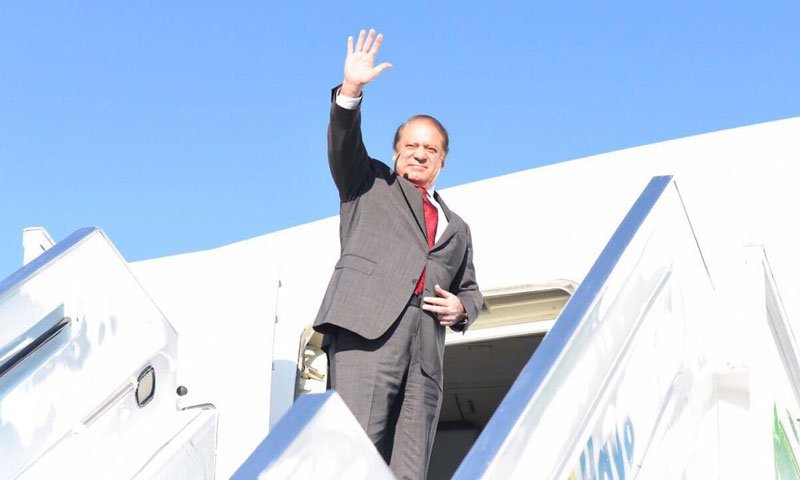Nawaz Sharif’s Return to Pakistan After 4 Years: A Game-Changer in a Tumultuous Political Landscape
Nawaz Sharif, the former prime minister of Pakistan who had been in self-exile for nearly four years, has returned to Pakistan, causing a significant upheaval in the already tense political landscape as the country anticipates a turbulent national election.
Sharif, a three-time prime minister of Pakistan who was previously ousted in a military coup, arrived at Islamabad airport, according to airport officials. He once led the Pakistan Muslim League (Nawaz), or PML-N, one of two dynastic parties that have long been dominant in the country’s political scene. In 2017, he was disqualified from holding office by a Supreme Court ruling related to corruption allegations. Subsequently, he was sentenced to seven years in prison on corruption charges, which he vehemently denied. However, his sentence was suspended on medical grounds, allowing him to leave the country for medical treatment, with the condition that he would return within four weeks—a requirement he had previously disregarded.
Sharif’s return coincides with an Islamabad court granting him protective bail, which shields him from arrest until his court appearance. This development intensifies the stakes in what is already shaping up to be a contentious election. Pakistan has been grappling with political unrest since the removal of another prime minister, Imran Khan, a former rival of Sharif.
In recent months, protests have erupted frequently in the streets, triggered by Khan’s removal, rising prices, and growing discontent towards the country’s influential military, which Khan’s supporters allege played a role in his ouster, a claim the military denies. Sharif, too, had attributed his downfall to the military, which has held power in Pakistan for extended periods since the country’s independence in 1947 and continues to wield significant influence. Before the 2017 ruling that marked the end of his third term as prime minister, he had been ousted in a coup in 1999 and removed from the position of prime minister by a military-backed president in 1993.
Nawaz Sharif’s younger brother, Shehbaz, welcomed the news of his brother’s bail, stating on Twitter that it was a “fundamental right.” He criticized the disqualification of the elected prime minister, Nawaz Sharif, as being based on a “fictitious and fabricated story” and stressed that his brother had been implicated in “absurd cases” and subjected to mistreatment. Shehbaz Sharif assumed the role of prime minister in 2022, continuing in the position until August of the current year when his government was replaced by a caretaker administration following the dissolution of parliament ahead of the upcoming national election, scheduled for early next year. He took office during a period marked by crippling inflation, soaring fuel and food prices, and a struggling economy—challenges that have impacted the popularity of the PML-N party. It is anticipated that Nawaz Sharif will lead the party’s election campaign.
In this evolving political saga, the return of Nawaz Sharif serves as a reminder of Pakistan’s enduring struggle for political stability and democratic continuity. As he steps back onto the Pakistani stage, his supporters are energized, and his detractors are equally resolute in their opposition. The upcoming national election will undoubtedly be a critical juncture in the nation’s history, where the electorate will cast its verdict amidst a cacophony of voices and under the watchful eyes of an influential military establishment.
In the midst of these challenges and confrontations, the people of Pakistan remain hopeful, seeking a path towards a more prosperous and stable future. The political developments that continue to unfold underscore the complexity and vibrancy of Pakistan’s democracy, where power, accountability, and representation are constantly under scrutiny.
While Nawaz Sharif’s return may be the catalyst for a fresh wave of political turmoil, it also represents the resilience of democratic ideals in Pakistan. As the nation hurtles towards the next election, it remains a fascinating and unpredictable journey, with the world watching closely to see which direction Pakistan’s political compass will ultimately point.
In conclusion, the return of Nawaz Sharif to Pakistan has the potential to significantly alter the political landscape in a country already grappling with internal strife and uncertainty. His comeback adds an intriguing dimension to the upcoming national election, which is already rife with tension and challenges. The political scenario in Pakistan is evolving rapidly, and the influence of key figures like Sharif and the ongoing power struggles will continue to shape the nation’s destiny in the months and years to come.

